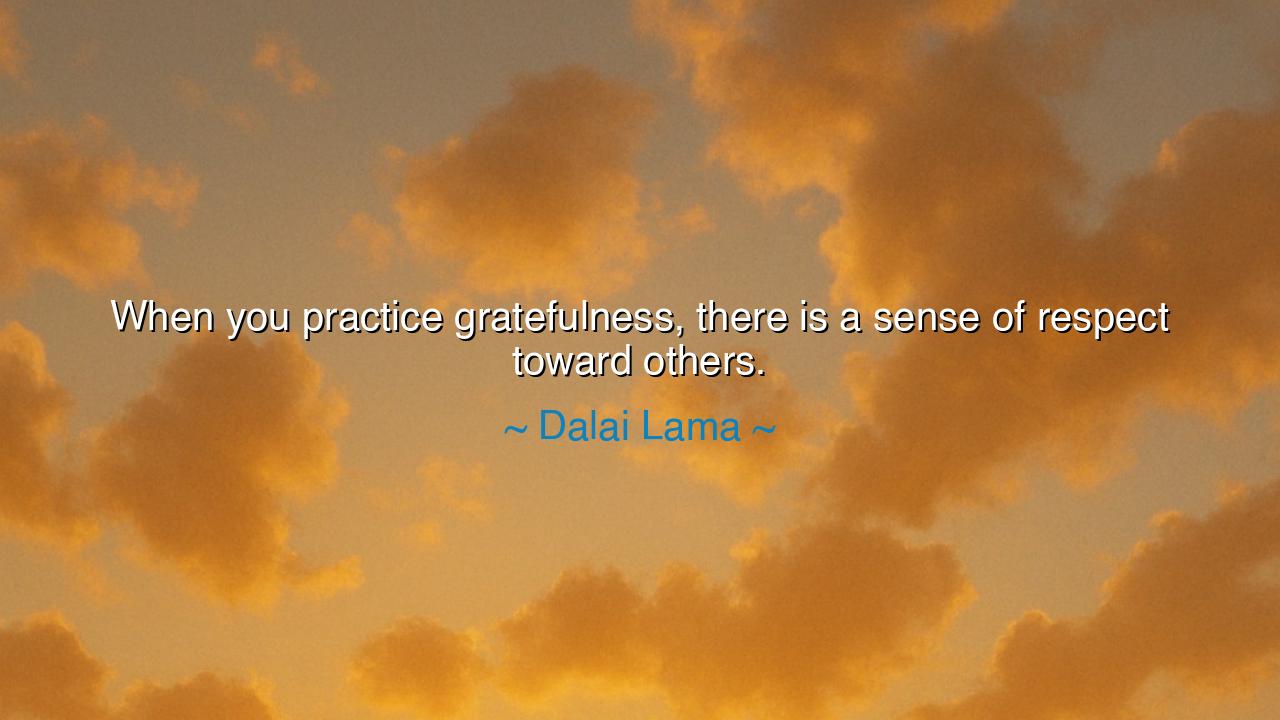
When you practice gratefulness, there is a sense of respect






The Dalai Lama, keeper of compassion and teacher of peace, gave the world a truth wrapped in gentle power: “When you practice gratefulness, there is a sense of respect toward others.” These words may appear as soft as falling snow, yet they carry the weight of mountains. For gratitude is not only a private feeling within the heart—it is a bridge that connects us to others, shaping how we see them, how we honor them, and how we live among them.
To practice gratefulness is to awaken the eyes of the soul. It is to look upon life and see not only what is missing, but what is given: the breath in the lungs, the bread on the table, the kindness of a stranger, the labor of countless hands that sustain us. Gratitude humbles us, for it reminds us that we are never alone in our blessings. No one eats bread without the farmer, the miller, the baker; no one walks safely without the watchful eyes of guardians of peace. Thus, when gratitude is practiced, respect naturally blooms, because we come to see others not as obstacles, but as gifts woven into the fabric of our existence.
The Dalai Lama’s wisdom echoes the voices of the ancients. The Stoic Epictetus once said that we are debtors to the universe, for everything we have has been given. The Psalms of old sing that every breath is praise. In these traditions, gratitude was never meant to remain hidden in the heart—it was meant to overflow into how we treat others, shaping a life of reverence, patience, and respect.
Consider the story of Mahatma Gandhi. Though he lived simply, he often spoke of his deep gratitude for the people around him, even those who opposed him. He saw the humanity in the poorest villager, in the jailer, even in the oppressor. This sense of gratitude gave rise to respect—a respect so deep that he resisted violence, even against those who sought to harm him. His strength was not forged from anger, but from thankfulness and reverence for the sacredness of life itself.
To forget gratitude is to fall into arrogance. When a man believes that all he has is by his own hand alone, he begins to look upon others with disdain. He forgets the silent sacrifices made for him, the mercies that protected him, the unseen hands that lifted him. In such blindness, respect withers, and pride takes its place. But when gratitude is practiced, arrogance melts away, and one can bow to the dignity of another without shame.
O children of tomorrow, hear this teaching: gratitude is not weakness, but strength. It is not mere politeness, but a force that transforms the heart. Practice it daily, and you will find yourself treating others with gentleness, seeing their struggles with compassion, honoring their presence with respect. To be grateful is to live awake, aware that life is shared, not hoarded.
The lesson is clear: respect flows from gratitude. Therefore, cultivate the discipline of thankfulness. Begin each morning by naming the mercies that surround you. Thank those who serve you, even in the smallest of ways. Look upon strangers not with suspicion, but with reverence, knowing that their lives, too, are part of the vast gift of existence. In this practice, you will become not only grateful, but honorable, a soul who uplifts rather than diminishes.
Thus, let the Dalai Lama’s words guide your days: “When you practice gratefulness, there is a sense of respect toward others.” Live this truth, and your presence will become a blessing to all who cross your path, a quiet light in a world too often blinded by pride. Gratitude will awaken respect, and respect will awaken peace—and in this way, both your life and the lives of others will be transformed.






AAdministratorAdministrator
Welcome, honored guests. Please leave a comment, we will respond soon